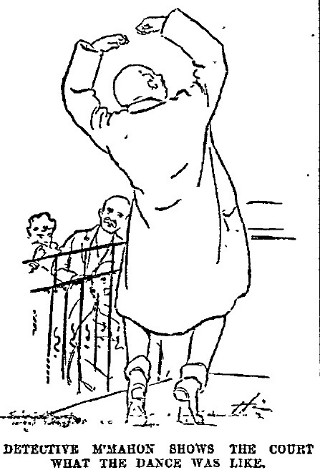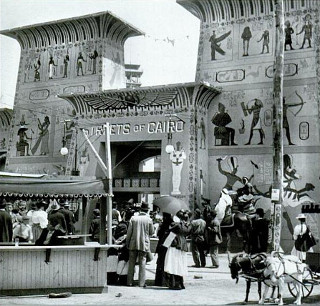From the Dec 5, 1893 Herald:
MIDWAY DANCERS GUILTY and FINED
POLICE JUSTICES MCMAHON, KOCH and DIVVER BRAND the DANSE DU VENTRE as SINFUL.
POLICEMENT TRY THE "WRIGGLE."
THEY ONLY DID IT AS an ILLUSTRATION, but FATIMA and ZELIKA LAUGHED at THEM.
WILLING TO DANCE IN COURT.
PRETTY ZELILKA MADE NO OBJECTION, BUT the JUSTICES VETOED the PROPOSITION.
It was a fifty dollar wriggle which Police Captain Berghold and his ward detectives saw in the Midway Plaisance annex of the Grand Central Palace on Monday afternoon last -- afternoon of awful recollections that it is. And it was a sinful wriggle at that.
There was some doubt about the nature of that wriggle when Justice Burke on that fateful afternoon held Zora of melting eyes, Fatima the sinuous and Zelika the meekly wicked for trial, and fixed yesterday as the date for their appearance.
But doubt exists no longer if the law be final, for yesterday morning, in the Court of Special Sessions, Police Justices McMahon, Koch and Divver, with the aid of the original wrigglers, a coterie of imitation wrigglers in the persons of Inspector Williams, Captain Berghold and a few ward detectives, Lawyer "Abe" Hummel, Anthony Comstock, a blushing interpreter and two experts on art as distinct from wickedness, wrestled at length with the danse du ventre in the presence of a wide-mouthed audience and set upon it the stamp of the law's disapproval.
Only Justice McMahon's repeated threat to have offenders ejected at the first sign of levity kept the crowd inside in order. It chuckled audibly at times, but the gnawing fear of being thrown out and losing such a show as this awed it into silence again. For it was a stirring spectacle from the moment Captain Berghold began his imitation of the horrifying things he had seen until the last wriggle was over and Anthony Comstock's shout of victory rose above the noise of retreat as the crowd reeled out into the open air.
No, the offence alleged in Captain Berghold's complaint against the dancers was that their exhibition was immodest to the point of indecency; so the burden of the inquiry was as to the precise nature of the dance. The evidence consisted of flat-footed assertions and extremely novel illustrations by the prosecuting witnesses, together with an attempt to draw the line sharply between the coldly artistic and the wickedly suggestive.
So it was that the dance was denounced one moment as a wholly degraded exhibition and defended the next as the representation of a state of ecstatic bliss, due to the frenzy of a religious devotee.
"Captain Berghold!" Justice McMahon called sharply, and the gray haired Captain, looking like a man on the way to the dentist's, climbed into the witness chair. He identified the prisoners, said he had seen the show on three occasions, told of the inroad it made upon his ideas of propriety and said it was unquestionably too immodest to be permitted.
"You saw this performance on a Friday and Saturday?" Mr. Hummel asked. The Captain pleaded guilty to both counts.
"You were then an officer of the law and recognized an offence against that law?"
"Yes."
"Make any arrests?"
"No."
"Why not? Was it worse on Monday than on Saturday?"
"No; about the same."
BERGHOLD NOT AN ANATOMIST.
"Well, you've spoken about the stomach. Do you know which part of the anatomy it is?"
"No," the Captain said vehemently, "I'm not a doctor."
"Well," Mr. Hummel rejoined, "It's not so very violent to assume that you might be able to locate the stomach. Didn't they move their arms and heads as well as their bodies?"
"Not at the time I have described. They held a veil in their hands so that it partially hid their eyes, and bending backward looked out from under it and moved their bodies."
"Didn't you know," Mr. Hummel said in affected horror, "that this dance originated with the Phoenicians and Greeks? As a matter of fact, isn't it only a rhythmical swaying of the whole body while the performer's feet are stationary?"
The Captain didn't know.
"Was the dress objectionable too?" asked Mr. Hummel, and, without awaiting a reply, he turned to the dark-eyed Zora, the most comely of the wrigglers, and said: -- "Won't you step up on this chair and give the Court an idea how you were attired?"
Seven men fell from a seat far in the rear in their anxiety to see, but the unseemly clamor was quelled on the instant.
Zora's brown arms swept away her white wrap and she bounded upon the chair in dancing costume, winked unconsciously at the Court and then became timid and doleful in an instant.
"There was no objection to the dress," the witness said. Zora stepped down and the spectators sank back into their seats.
Captain Berghold, before leaving the chair, gave a feeble imitation of the contortions which he had considered ground for the arrest.
|
FATIMA LAUGHED WHEN DENNIS TRIED IT.
The Captain lacked abandon, but Dennis McMahon, the ward man who succeeded him on the stand, after a brief statement about the unseemly "extorting" of fair forms, which elicited an exclamation of horror from Lawyer Hummel, illustrated the dance with greater freedom. He stood up, pulled the skirts of his coat out of the way and executed a slight twist. Fatima laughed outright, and the other young women shook with ill concealed mirth. Mr. McMahon blushed. The Court thundered the crowd into silence.
"Their arms moved too, then?" Mr. Hummel suggested.
"Yes."
Inspector Williams proved the heavy gun of this prosecution. His illustrations were few, but his language was plain. He insisted that the performance was immodest in the extreme and said that when the dancers began their swaying and contortions many women fled in horror and disgust from the building.
"I have some letters here from respectable persons who were shocked beyond measure," the Inspector said and attempted to hand them to Justice Koch.
"Stop!" thundered Mr. Hummel. "The time when women may be assailed by letters here has passed."
The letters were ruled out and the Inspector stepped down. Captain Berghold at once climbed back into the witness chair un summoned, and Mr. Hummel stormily drowned his attempts at speech until the Court formally recalled the Captain as a witness. Captain Berghold merely wished to explain that he had rambled through anatomy and had finally trailed the stomach to its lair. He wanted to state definitely what he had meant by "stomach" in his previous testimony.
Justice McMahon's mallet stilled the rising tumult, and the Captain gave his little lecture on anatomy, glanced at Mr. Hummel in triumph and retired.
SAYS THE KEDIVE LIKED IT.
A.F. Delacroix, the manager of the Little Cairo, testified that he had seen the danse du ventre in company with the Khedive of Egypt, and said the exhibition was considered in excellent taste in Egypt. In Chicago the dance had been witnessed by many women of good position and some clergymen as well.
"Even by lawyers?" Mr. Hummel asked. "Yes," Delacroix said, "even by lawyers."
Then Lawyer Hummel called Zora. Now, Zora had been in a sort of dreamy brown study and had been viewing every one within range with wide eyes, but contemplatively. She started up at the sound of her name, wrapped the white wool about her as if to ward off staring eyes and stepped toward the witness stand. Then, with a sudden gasp and cry, she threw the white wrap over he head and sank back into her seat in a fit of stormy weeping.
Zelika was not so easily scared. The blushing interpreter said something about Allah and Zelika looked heavenward, kissed the Good Book daintily and was ready. She was coolness itself until the questioning became so pointed that the interpreter was visibly embarrassed. Then she became embarrassed too. Zelika was sorry for the interpreter.
"I am seventeen and a half years old," she said, as she gave the crowd back its bold looks. "I have danced this same dance in Egypt and in Chicago. I was never charged with immodesty." The interpreter whispered, then he translated:--
"There is no thought of impropriety about it. We done it as a natural dances. It is only evil to those who have evil in their hearts. it is a rhythmic movement of arms and body."
"Have you any objection to showing the Court exactly what you did on the occasion in question, how you dance it?" Mr. Hummel asked.
"We will proceed without that." Justice McMahon interposed. "We do not care to see it."
COMSTOCK'S EVIDENCE WASN'T NEEDED.
There was a moment's pause and then Anthony Comstock suddenly arose and began to address the Court from a place near Mr. Hummel. "Your Honors," Mr. Comstock said loudly, "I have seen this dance in Chicago, too. I know and I can prove" --
"Oh! oh! Now this cannot be allowed," thundered Mr. Hummel. "I insist that the Court needs no instruction. You mustn't. Mr. Comstock."
"But," Mr. Comstock resumed in a still higher key, "if evidence to show" -- "That will do," Justice McMahon said decisively. "The Court has already made up its mind."
"Yes?" from Mr. Hummel.
"I am the friend of American womanhood!" shouted Mr. Comstock. "So am I," rejoined Mr. Hummel as he dodged Zora's grateful glances.
Bang! went the court's order hammer, and there was silence.
"The Court finds you guilty," Justice McMahon said, "and fines you $50 each."
"The stenographer will note my intention to appeal," remarked Mr. Hummel.
Then the crowd hurried away and four sinuous wigglers in four white wraps went out into the cold, unwriggling world.
Ahmed Hamouda, late of the Egyptian Army, writes to the Herald to say that the danse du ventre is not practiced in Egypt by women of good repute, that it is not a representative national dance and would not be countenanced there. It is, he says, distinctly immodest.
Mme. Delacroix was instructing the dancers in a new dance last night when Captain Berghold appeared and ordered the proceedings stopped. Mr. Delacroix refused and ordered Captain Berghold out, saying he had no business there, as it was not a public performance.
|

